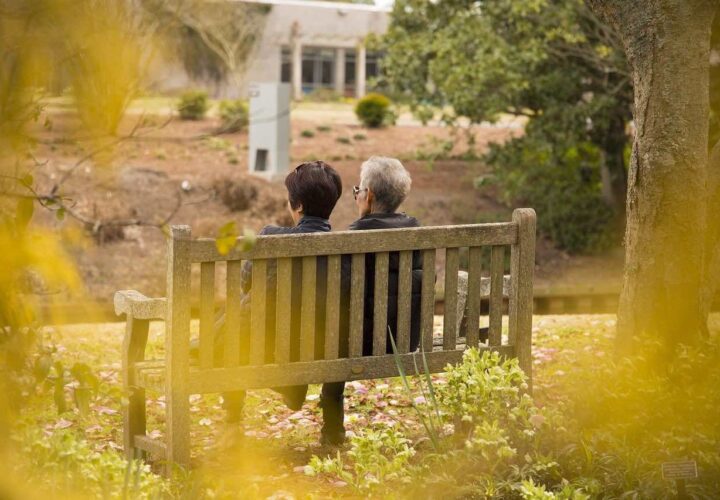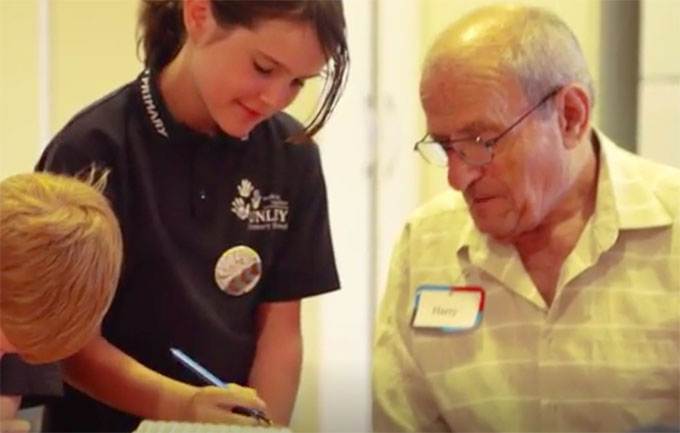In the Netherlands, a nationwide dementia awareness initiative, Samen Dementievriendelijk, helps make spaces like grocery stores more dementia-inclusive.
What happens when a person who appears to show signs of Alzheimer’s or another form of dementia walks out of a supermarket in the Netherlands without paying for their groceries? In 2015, in the Dutch village of Doorn, the police were called, according to the Netherland’s then-minister of health. But now, a growing initiative by the Dutch government and Alzheimer Nederland to raise awareness of how to recognize and interact with people who have Alzheimer’s or other forms of dementia is helping to avert confrontation and confusion.
Since 2016, the public awareness project, called Samen Dementievriendelijk (“Dementia Friendly Together”), has trained Dutch store workers to help them identify when a shopper might have dementia, and to guide their interactions accordingly. The trainings, which are also tailored for other sectors including municipal government, dentists, hairdressers, and public transportation, are part of an effort to make it easier for people with dementia to participate in day-to-day errands and activities in their communities.
“Our goal is to make people with dementia participate as long as they can in the society,” Jarina Rombouts of Samen Dementievriendelijk told Being Patient. “It helps if people recognize the signals of dementia, and know how to behave to people with dementia.”
At stores, it’s not just that someone might leave without remembering to pay; they might forget their PIN code when they’re checking out, or come to the store every day to buy the same item, like a bag of sugar, Rombouts said.
Teaching Dementia Awareness
Through online quizzes and in-person training sessions, Samen Dementievriendelijk teaches service workers to keep an eye out for certain signs that indicate someone might have Alzheimer’s or dementia. Some courses offer scenarios specific to certain settings, like dentist offices, on public transportation, or at restaurants, and one course is broader for the general public.
A core part of all the programs is a four-part outline on how to interact with a person who may show signs of living with dementia: First, be calming and non-confrontational. Second, make eye contact, ask one question at a time, leaving the customer ample time to respond. Third, think along with the person — ask how you can help and make suggestions. And finally, end conversations on a positive note, with a thank you.
“Our goal is to make people with dementia participate
as long as they can in the society. It helps if people
recognize the signals of dementia, and
know how to behave to people with dementia.”
–Jarina Rombouts, Samen Dementievriendelijk
More than half a million people have completed the dementia-friendly training program since its launch in 2016, according to Rombouts. The largest grocery store chain in the country, Albert Heijn, has held 62 in-person trainings around the Netherlands, and dozens more have been held at other store chains, and the online program for store workers has been completed more than 12,000 times.
Rombouts said feedback from people living with dementia and their caregivers suggests that more public awareness reduces stress and gives people more confidence to continue to be active and involved in activities in public.
The largest grocery store chain in
the country has held 62 in-person
trainings around the Netherlands… The
online program for store workers has been
completed more than 12,000 times.
“They don’t have this fear that they will not be understood,” she said, “or that they are confused or that they are not being helped.”
Toward more dementia-inclusive communities
Lack of awareness of dementia can have devastating consequences. After a woman with dementia started to leave a Walmart without paying for $13.88 worth of goods in Colorado in 2020, police arrested and violently restrained her, breaking her arm.
Programs that aim to raise public awareness about dementia and educate people about how to improve interactions when someone is showing signs of the disease are growing around the world. In Japan, the United Kingdom, Canada and many other countries, similar initiatives offer guidance for employees in different sectors who may encounter people with Alzheimer’s or another form of dementia.
Dr. Jodi Sturge, a postdoctoral researcher at the University of Groningen, said that public education programs like the one in the Netherlands have benefits. Trainings help people develop skill sets so they can respond respectfully when someone is showing signs that might be associated with dementia.
Lack of awareness of dementia can have devastating
consequences. After a woman with dementia started
to leave a Walmart without paying for $13.88 worth
of goods in Colorado in 2020, police arrested and
violently restrained her, breaking her arm.
“It gives people an ability to feel like they can do something in those moments,” Sturge said.
The majority of people with dementia live at home, not in an institution, Sturge noted, and many live alone — routine tasks like grocery shopping, interacting with your local municipal government, and taking the train are part of life. But public places like grocery stores can be challenging for people with dementia, because they can be overstimulating and their layouts can be confusing, she said.
Sturge said that public education training could be improved by being more inclusive. Often training tends to focus on identifying older people, when dementia also impacts people at younger ages. And signs of dementia are often less visible, she said — not only forgetfulness and disorientation, but also depression or agitation. This type of education could be incorporated into society more broadly, for example, being included in primary school curricula, she said.
On a larger scale, Sturge said, rather than “dementia-friendly,” a better approach would be to be “dementia-informed.” While the phrasing “dementia-friendly” is infantilizing, she said, being “dementia-informed,” similar to “trauma-informed,” emphasizes bringing in the experiences of people who have dementia.
Dementia awareness education could be incorporated
into society more broadly, for example, being
included in primary school curricula.
“It’s more a strength-based approach to understanding what people have, what they can do, and almost empowering people in their decisions,” Sturge said.





